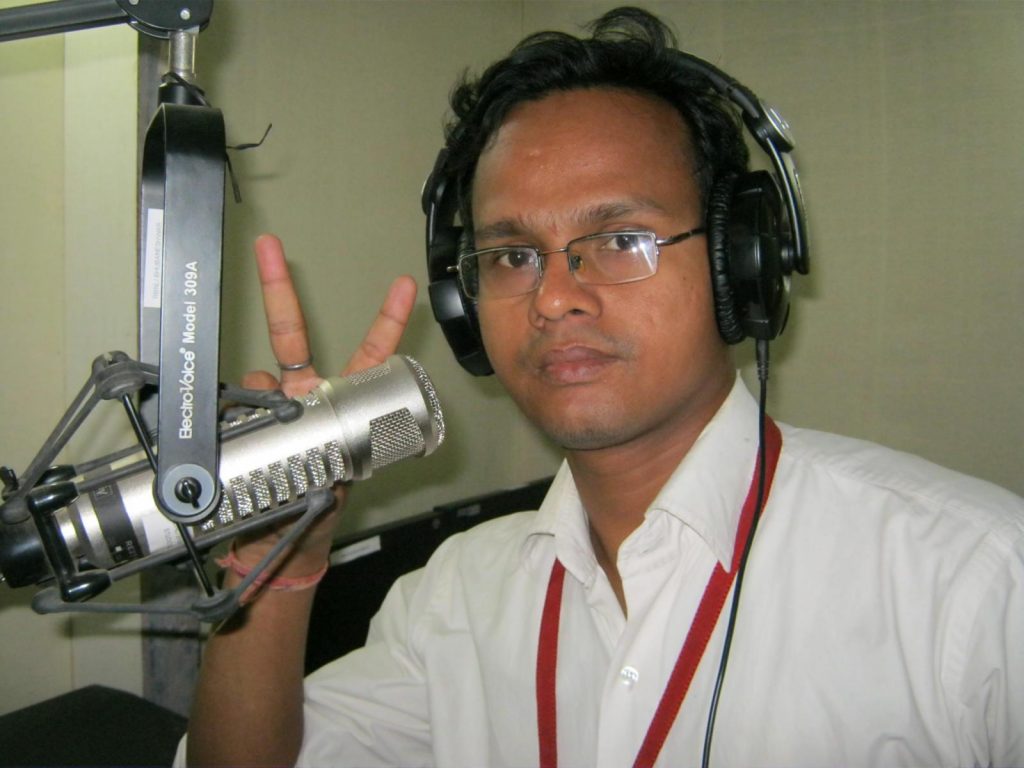Anadi Puhan is a sound engineer, but eradicating superstitions through songs is his passion. Ignorance about scientific developments among the downtrodden in society has thwarted the campaign against superstitions, he says.
Hailing from Jagatsinghpur, Anadi had a difficult childhood. His father died when he was barely five. Poverty forced his mother to send him to Sishu Ashram, an orphanage funded by Enfants Espoir Du Monde (EEDM), France and the government of Odisha at Jagatsinghpur.
“I was brought up in the orphanage. I am a strong believer in the adage ‘If there is a will, there is a way’ and that instilled a positive attitude in me. Though I had to struggle a lot during my childhood, I trusted God and didn’t give up. My positive attitude helped me achieve success in academics and music. I owe my success to quite a few persons including Dr Sashikant Acharya, the founder of Sishu Ashram who spotted my talent, and EEDM members Dr Daniel Satge, Francine Simon and Andre Simon for rebuilding my lost childhood and bringing me back on track,” said Anadi.
Explaining his fondness for music, Anadi said, “During my school days, I used to pen Odia songs and sing them. A few friends and teachers liked the songs and encouraged me. This was the beginning of my musical journey.”
Anadi learnt classical music from Guru Niranjan Prusty who used to come to Sishu Ashram to teach music. He caught the attention of EEDM members who decided to bear the educational expenses for his higher studies after he cleared the Class X board examination with flying colours. Thanks to them, he joined the department of television sound engineering at the Biju Patnaik Film and Television Institution and topped the diploma class. Since then, he has been working in the music industry as a sound engineer and programme producer. Besides, he has also been working as a radio jockey at RBNL (92.7 Big FM).
Asked why he chose to create awareness about superstitions, Anadi said, “Witch-hunting goes on unabated in the tribal pockets of Odisha. Besides, hot iron branding or inflicting burn injuries on the body as a remedy to cure various illnesses is still prevalent in many underdeveloped districts like Koraput, Kalahandi, Malkangiri, Rayagada, Sambalpur and Sundargarh. Odisha became the fourth state in the country after Bihar, Chhattisgarh and Jharkhand to enact a law against witch-hunting with the Odisha Prevention of Witch–hunting Act in 2013 but witchcraft is still widely prevalent in tribal villages. My aim is to popularise medical science in the rural areas to cure diseases and generate awareness among people against practices like black magic, witchcraft and other age-old superstitions through my songs.”
Anadi gives credit to Sashikant sir for the awareness he has managed to create in rural areas. As Anadi used to pen good lyrics, Sashikant asked him to write some melodious songs to hold the interest of the audience at the awareness meetings and motivate them. Anadi wrote 30 songs focused on the theme of superstitions. It worked and students as well as villagers listened to the songs penned and sung by Anadi with a lot of interest.
“Sashikant sir was all praise for me after his meetings yielded a positive response. I even got letters from schoolteachers appreciating my writing and singing skills. Now, both of us are working hard for the cause,” said Anadi.
Sashikant and Anadi travel to various villages to educate people against superstitions. They conduct theory and practical classes in villages and schools. “Some of the superstitions are deep rooted in the psyche of these villagers. So, it will take time to wipe them out,” said Anadi. However, he knows that education is the best weapon to eradicate superstitions from society. Anadi has received quite a few awards for his contribution to making Odisha superstition-free.
During Cyclone Fani, Anadi played his part in alerting people about the storm. “During the cyclone, radio was the only medium of communication as there was no electricity. Big FM jockeys remained on air 24×7 after the storm hit the state. Being part of the team, I worked hard at updating the status of the storm, alerting people about the weather forecast and trying to get help from the local administration. We visited placed like Puri, Khordha and Cuttack and talked to people and publicised their problems continuously for more than 15 days. There were so many technical issues, but we never quit and kept trying to reach out to people. A small contribution from each individual can bring changes in society,” said Anadi, who is leading a happy life with his mother, wife and kids in Bhubaneswar.
RASHMI REKHA DAS, OP
